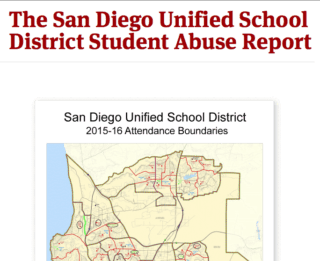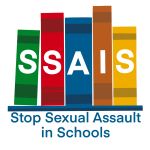By SSAIS Co-founder and Executive Director Esther Warkov, Ph.D
To raise awareness about students’ rights under Title IX, SSAIS.org spotlights the efforts of education advocates across the country. Earlier we looked at education activists in Berkeley, CA. Here we look at community activism in California’s second largest school district, San Diego Unified.
 San Diego Unified School District was recently the subject of media reports describing how the district’s mishandling of sexual assaults warranted an investigation by the U.S. Department of Education (Office for Civil Rights). According to reporter Chris Young who broke the story, the federal investigation occurred after the school failed to appropriately respond to a sexual assault report involving a kindergarten boy in the bathroom. In their complaint, the victim’s parents recounted a series of obstacles that illustrate how school districts avoid following prescribed complaint pathways.
San Diego Unified School District was recently the subject of media reports describing how the district’s mishandling of sexual assaults warranted an investigation by the U.S. Department of Education (Office for Civil Rights). According to reporter Chris Young who broke the story, the federal investigation occurred after the school failed to appropriately respond to a sexual assault report involving a kindergarten boy in the bathroom. In their complaint, the victim’s parents recounted a series of obstacles that illustrate how school districts avoid following prescribed complaint pathways.
To excuse the district’s failures, the San Diego district claimed that its zero tolerance for sexual harassment did not apply to elementary schools “because elementary students do not have the relevant mental state for engaging in sexually harassing behavior.” Young’s report is exemplary for its inclusion of the OCR resolution letter and links to important background information.
Concerned San Diego educators and parent advocates have created the website District Deeds: Investigating San Diego Unified School District. The website includes media reports, documents illustrating violations of students, and a map showing the schools where assaults occurred. “Despite the large number of assaults on the map, there are considerably more because school police do not report crimes on the campuses, as required by California state laws,” said one educator-advocate, Judy Neufeld-Fernandez.
Undisclosed sexual harassment and violence at San Diego Unified illustrates a serious problem that affects students nationwide. According to Neufeld-Fernandez, “a culture of secrecy in San Diego Unified School District has led to the sexual abuse of students. The betrayal begins with the public’s trust that our schools are safe: the public is unaware that schools are fertile ground for sexual predators. In 2004, the US Department of Education published data stating that nearly 10% of students surveyed report being the victim of sexual molestation at school. Yet only 11% of educators say they would report sex abuse of children. These two statistics are a galvanizing wake-up call for parents. Schools are failing to protect kids and parents must step up their own means of protection. We constantly hear of children in the care of adults being preyed upon in the news. Yet, for each publicized incident, many incidents are suppressed and parents are kept in the dark.”
Social worker and San Diego parent Lucy Wuellner recommends that to “shatter the culture of silence, districts must clearly define the reporting process, including reporting laws and definitions of abuse (adult and peer) in their literature and on their websites. And just as important, teachers and school administrators must fulfill their responsibility as mandatory reporters. A mandated reporter’s responsibility is to report, not to convict. Failure to report should be met with severe consequences e.g. suspension or dismissal.”
San Diego advocates want their district to provide a spectrum of training that ranges from implementing federal safeguards like Title IX to local procedures. Neufeld-Fernandez is concerned that “parents’ pleas to implement low-cost child protection measures were ignored,” and “efforts to introduce and implement a variety of training measures were met with a tepid response. The SDUSD actively dismissed programs found effective elsewhere such as Florida’s Department of Education’s Educator Misconduct program.”
San Diego advocates believe that their district’s pervasive problems must be remedied through a public awareness campaign to bring about cultural change. They want an independent agency for investigations of abuse in schools, and clarification for teachers and administrators about how organizations like Child Protective Services, District Attorney, San Diego Police and San Diego Unified School Police fit into the constellation of resources serving students. According to Lucy Wuellner, “this will result in a continuum of support rather than cases falling through the agency cracks.” She believes that “turning the culture of silence into a culture of vigilance” (in the words of Charles Wilson, Director of the Chadwick Center for Children and Families) needs to be the community’s war cry.
The culture of vigilance must extend nationwide. That’s why Stop Sexual Assault in Schools received funding from the American Association of University Women to educate families about students’ right to an education free from sexual harassment, violence, and gender-based discrimination under Title IX. Until schools have an incentive to comply with Title IX, students, families, and stakeholders must be proactively engaged to safeguard students’ rights. By so doing, we improve outcomes for K-12 students while addressing the breeding ground for college sexual assault.
Related Reports
- Should San Diego, Carlsbad Schools Have Told Parents About Sex-Assault Investigations?
- Federal Sex-Assault Investigation Leads To SD Unified Reform; Carlsbad Inquiry Ongoing
- Combatting the Epidemic of K-12 Sexual Harassment and Sexual Violence
- What the White House Asked Us About K-12 Sexual Violence
